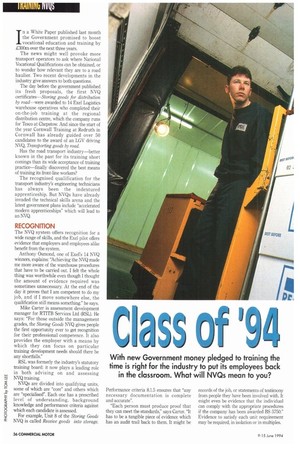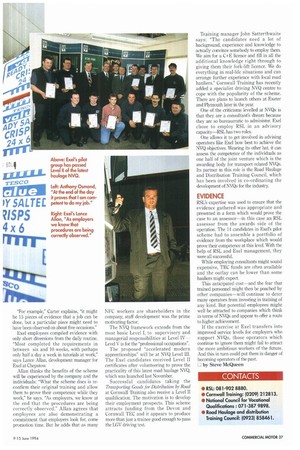lass of '94
Page 40

Page 41

If you've noticed an error in this article please click here to report it so we can fix it.
With new Government money pledged to training the time is right for the industry to put its employees back in the classroom. What will NVQs mean to you?
In a White Paper published last month the Government promised to boost vocational education and training by £300m over the next three years.
The news might well provoke more transport operators to ask where National Vocational Qualifications can be obtained, or to wonder how relevant they are to a road haulier. Two recent developments in the industry give answers to both questions.
The day before the government published its fresh proposals, the first NVQ
certificates Storing goods for distribution by road—were awarded to 14 Exel Logistics warehouse operatives who completed their on-the-job training at the regional distribution centre, which the company runs for Tesco at Chepstow. And since the start of the year Cornwall Training at Redruth in Cornwall has already guided over 50 candidates to the award of an LGV driving NVQ, Transporting goods by road.
Has the road transport industry—better known in the past for its training short comings than its wide acceptance of training practice—finally discovered the best means of training its front-line workers?
The recognised qualification for the transport industry's engineering technicians has always been the indentured apprenticeship. But NVQs have already invaded the technical skills arena and the latest government plans include "accelerated modern apprenticeships" which will lead to an NVQ.
RECOGNITION
The NVQ system offers recognition for a wide range of skills, and the Exel pilot offers evidence that employers and employees alike benefit from the system.
Anthony Osmond, one of Exel's 14 NVQ winners, explains: "Achieving the NVQ made me more aware of the warehouse procedures that have to be carried out. I felt the whole thing was worthwhile even though I thought the amount of evidence required was sometimes unnecessary. At the end of the day it proves that I am competent to do my job, and if I move somewhere else, the qualification still means something" he says.
Mike Carter is assessment development manager for RTITB Services Ltd (RSL). He says: "For those outside the management grades, the Storing Goods NVQ gives people the first opportunity ever to get recognition for their professional competence. It also provides the employer with a means by which they can focus on particular training development needs should there be any shortfalls."
RSL was formerly the industry's statutory training board: it now plays a leading role in both advising on and assessing NVQ training.
NVQs are divided into qualifying units, some of which are "core" and others which are "specialised". Each one has a prescribed level of understanding, background knowledge and performance criteria against which each candidate is assessed.
For example, Unit 8 of the Storing Goods NVQ is called Receive goods into storage.
Performance criteria 8.1.5 ensures that any necessary documentation is complete and accurate".
"Each person must produce proof that they can meet the standards," says Carter. "It has to be a tangible piece of evidence which has an audit trail back to them. It might be records of the job, or statements of testimony from people they have been involved with. It might even be evidence that the individual can comply with the appropriate procedures if the company has been awarded BS 5750." Evidence to satisfy each unit requirement may be required, in isolation or in multiples. "For example," Carter explains, "it might be 15 pieces of evidence that a job can be done, but a particular piece might need to have been observed on about five occasions."
Exel employees compiled evidence with only short diversions from the daily routine. "Most completed the requirements in between six and 10 weeks, with perhaps only half a day a week in tutorials at work," says Lance Allan, development manager for Exel at Chepstow.
Allan thinks the benefits of the scheme will be experienced by the company and the individuals: "What the scheme does is reconfirm their original training and allow them to prove their competence while they work," he says. "As employers, we know at the end that the procedures are being correctly observed." Allan agrees that employees are also demonstrating a commitment that employers look for, come promotion time. But he adds that as many
NFC workers are shareholders in the company, staff development was the prime motivating factor.
The NVQ framework extends from the most basic Level I, to supervisory and managerial responsibilities at Level IV-Level V is for the "professional occupations".
The proposed "accelerated modern apprenticeships" will be at NVQ Level III. The Exel candidates received Level II certificates after volunteering to prove the practicality of this latest road haulage NVQ, which was launched last November, Successful candidates taking the Transporting Goods for Distribution by Road at Cornwall Training also receive a Level II qualification. The motivation is to develop their employment prospects. This scheme attracts funding from the Devon and Cornwall TEC and it appears to produce more than just a trainee good enough to pass the LGV driving test.
Training manager John Satterthwaite says: "The candidates need a lot of background, experience and knowledge to actually convince somebody to employ them. We aim for a C+E licence and fill in all the additional knowledge right through to giving them their fork-lift licence. We do everything in real-life situations and can arrange further experience with local road hauliers." Cornwall Training has recently added a specialist driving NVQ centre to cope with the popularity of the scheme. There are plans to launch others at Exeter and Plymouth later in the year.
One of the criticisms levelled at NVQs is that they are a consultant's dream because they are so bureaucratic to administer. Exel chose to employ RSL in an advisory capacity—RSL has two roles.
One allows it to get involved in advising operators like Exel how best to achieve the NVQ objectives. Wearing its other hat, it can assess the competence of the individuals as one half of the joint venture which is the awarding body for transport related NVQs. Its partner in this role is the Road Haulage and Distribution Training Council, which has been involved in co-ordinating the development of NVQs for the industry.
EVIDENCE
RSL's expertise was used to ensure that the evidence gathered was appropriate and presented in a form which would prove the case to an assessor—in this case an RSL assessor from the awards side of the operation. The 14 candidates in Exel's pilot scheme had to assemble a portfolio of evidence from the workplace which would prove their competence at this level. With the help of RSL and Exel management, they were all successful.
While employing consultants might sound expensive, TEC funds are often available and the outlay can be lower than some hauliers might expect.
This anticipated cost—and the fear that trained personnel might then be poached by other companies—will continue to deter many operators from investing in training of any kind. But potential employees might well be attracted to companies which think in terms of NVQs and appear to offer a route to higher achievement.
If the exercise at Exel transfers into improved service levels for employers who support NVQs, those operators which continue to ignore them might fail to attract the more ambitious workers of the future. And this in turn could put them in danger of becoming operators of the past.
Li by Steve McQueen




























































































